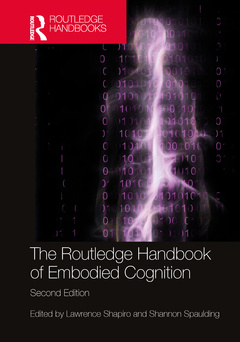The Routledge Handbook of Embodied Cognition (2nd Ed.) Routledge Handbooks in Philosophy Series

Embodied cognition is one of the foremost areas of study and research in philosophy of mind, philosophy of psychology, and cognitive science. The Routledge Handbook of Embodied Cognition is an outstanding guide and reference source to the key topics and debates in this exciting subject and essential reading for any student and scholar of philosophy of mind and cognitive science.
Extensively revised and enlarged for this second edition, the Handbook comprises 42 chapters by an international team of expert contributors and is divided into ten parts:
? Historical Underpinnings
? Perspectives on Embodied Cognition
? Embodied Cognition and Predictive Processing
? Perception
? Language
? Reasoning and Education
? Virtual Reality
? Social and Moral Cognition and Emotion
? Action and Memory
? Reflections on Embodied Cognition.
The early chapters of the Handbook cover empirical and philosophical foundations of embodied cognition, focusing on Gibsonian and phenomenological approaches. Subsequent chapters cover additional, important themes common to work in embodied cognition, including embedded, extended, and enactive cognition as well as chapters on empirical research in perception, language, reasoning, social and moral cognition, emotion, consciousness, memory, and learning and development.
For the second edition many existing chapters have been revised and seven new chapters added on: AI and robotics, predictive processing, second-language learning, animal cognition, sport psychology, sense of self, and critiques of embodied cognition, bringing the Handbook fully up to date with current research and debate.
Introduction Lawrence Shapiro
Part 1: Historical Underpinnings
1. Phenomenology and Embodied Cognition Shaun Gallagher
2. A Ten Commandments for Ecological Psychology Claire Michaels and Zsolt Palatinus
3. Embodied Cognition and AI/Robotics
Part 2: Perspectives on Embodied Cognition
4. Extended Cognition Ken Aizawa
5. Complex Dynamical Systems Modeling in the Cognitive Sciences Anthony Chemero and Michael Richardson
6. The Role of the Motor System in Cognitive Functions Laila Craighero
7. Embedded and Situated Cognition Michael Dawson
8. The Enactive Approach Ezequiel Di Paolo and Evan Thompson
9. Embodied Cognition and Predictive Processing
Part 3: Applied Embodied Cognition: Perception, Language and Reasoning
10. Music Perception and Embodied Music Cognition Marc Leman and Pieter-Jan Maes
11. Enactive Vision Erik Myin and Jan Degenaar
12. Perception and/for/with/as Action Cedar Reiner and Jeanine Stefanucci
13. Different Bodies, Different Minds: The Body Specificity of Language and Thought Daniel Casasanto
14. Embodiment and Language Comprehension Michael Kaschak, John L. Jones, Julie Carranza, and Melissa R. Fox
15. Embodiment and Language Claudia Scorolli
16. Linking Words to World: An Embodiment Perspective Chen Yu
17. Gesture in Reasoning: An Embodied Perspective Martha Alibali, Rebecca Boncoddo, and Autumn Hostetter
18. The Embodied Dynamics of Problem Solving: New Structure from Multi-Scale Interactions Jay Dixon, Damian Kelty-Stephen, and Jason Anastas
19. Grounded Mathematical Reasoning Mitchell Nathan
20. Embodied Cognition and Second Language Learning
21. Embodied Interaction, Coordination and Reasoning in Computer Gameplay Tarja Susi
Part 4: Applied Embodied Cognition: Social, Moral, and Animal Cognition
22. Embodied Cognition and Theory of Mind Shannon Spaulding
23. When Bodies Interact… Culture is Born Tamer Soliman and Art Glenberg
24. Morality in the Flesh: A Review of Psychological Literature Chen-Bo Zhong and Brendan Strejcek
25. Body and Emotion Michelle Maiese
26. Embodied Emotion Concepts Paula Niedenthal, Adrienne Wood, and Magdalena Rychlowska
27. Embodiment in the Construction of Emotion Experience and Emotion Understanding Suzanne Oosterwijk and Lisa Feldman Barrett
28. Embodied Animal Cognition
29. Embodied Cognition and Sport Psychology
Part 5: Applied Embodied Cognition: Memory, Attention, Self-hood, and Group Cognition
30. Visual Experience Michael Madary
31. First-order Embodiment, Second-order Embodiment, Third-order Embodiment Thomas Metzinger
32. Acting for Bodily Awareness Frederique de Vignemont
33. Embodiment and Sense of Self
34. Memory and Action Katinka Dijkstra and Rolf Zwaan
35. The Embodiment of Attention in the Action-Perception Loop Michael Spivey and Stephanie Huette
36. Embodied Remembering John Sutton and Kellie Williamson
37. Embodiment, Cognition and the World Wide Web Paul Smart
38. The Constitution of Group Cognition Gerry Stahl
39. Varieties of Group Cognition Georg Theiner
Part 6: Meta-Topics
40. Cognition Gary Hatfield
41. Revolution, Reform, or Business as Usual? The Future Prospects for Embodied Cognition Michael Wheeler.
Index
Lawrence Shapiro is the Berent Enç Professor of Philosophy at the University of Wisconsin–Madison, USA. The American Philosophical Association awarded his book Embodied Cognition the Gittler Award for outstanding contribution in the field of philosophy of the social sciences (second edition 2019, Routledge).
Shannon Spaulding is an Associate Professor of Philosophy at Oklahoma State University, USA. Her research focuses on social cognition, imagination, and embodied cognition. She is the author of the book How We Understand Others: Philosophy and Social Cognition (Routledge 2018).
Date de parution : 06-2024
17.4x24.6 cm
Mots-clés :
extended; group; sensorimotor; contingencies; approach; cognitive; science; representation; social; ecological



